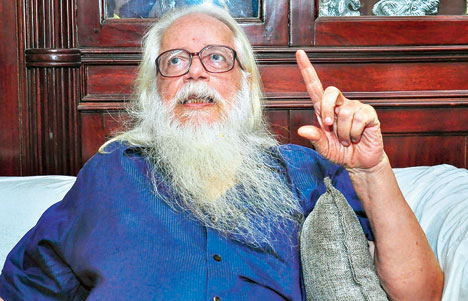
New Delhi: The Supreme Court on Friday awarded Rs 50 lakh as compensation to former Isro scientist S. Nambi Narayanan, arrested by Kerala police in an alleged espionage case in 1994, to send a strong message that "malicious prosecution" would not be tolerated.
The court also set up a committee headed by former Supreme Court judge D.K. Jain to determine the appropriate disciplinary action against the officers who investigated the case - S. Vijayan, the then inspector, special branch, Thiruvananthapuram city; K.K. Joshwa, the then deputy superintendent, CB CID, Thiruvananthapuram; and S. Siby Mathews, the then DIG (Crimes) of the special investigation team.
A bench of Chief Justice Dipak Misra and Justices A.M. Khanwilkar and D.Y. Chandrachud clarified that the Rs 50 lakh compensation would be separate from the Rs 1-crore defamation suit Narayanan had filed in a Kerala civil court, which is pending.
The verdict came on an appeal by Narayanan challenging a 2015 judgment of Kerala High Court refusing to order disciplinary action against the police officers for falsely implicating him and other accused.
The CBI, which had earlier investigated the matter, had said in a report that no case was made against Narayanan and others. It had recommended disciplinary action against the responsible police officers for malicious prosecution and custodial torture.
"Keeping in view the report of the CBI... suitable compensation has to be awarded, without any trace of doubt, to compensate the suffering, anxiety and the treatment by which the quintessence of life and liberty under Article 21(personal life and liberty) of the Constitution withers away," the apex court said.
"We think it appropriate to direct the State (to pay) a sum of Rs. 50 lakhs towards compensation to the appellant and, accordingly, it is so ordered. The said amount shall be paid within eight weeks by the State. We hasten to clarify that the appellant, if so advised, may proceed with the civil suit wherein he has claimed more compensation. We have not expressed any opinion on the merits of the suit," the Chief Justice, writing the judgment, said.
In January 1994, an FIR was registered at Vanchiyoor police station against Mariam Rasheeda, a Maldivian national, under Section 14 of the Foreigners Act, 1946 and paragraph 7 of the Foreigners Order for alleged espionage activities.
In November that year, cases under the Official Secrets Act were registered, and scientists D. Sasikumaran and Narayanan were arrested along with another Maldivian national Fousiya Hasan. That December, the CBI took over the case on a request from the state government.
After the CBI reported that the allegations were not proved, the trial court discharged all the accused in May 1996. But the following month, the Kerala government decided to get the police to re-investigate. Narayanan challenged this notification, which was quashed by the Supreme Court. In his appeal Naryanan who during the hearing personally appeared in the case and was also represented by a senior advocate argued that the prosecution had a catastrophic effect on his service career as a leading and renowned scientist at ISRO, smothering his career, lifespan, savings, honour, academic work as well as self-esteem. The arrest and incarceration for nearly 50 days had devastated the peace of his entire family.Upholding his plea, the apex court said: "We are of the view that the appellant was arrested and he has suffered custody for almost fifty days.
"... entire prosecution initiated by the State police was malicious and it has caused tremendous harassment and immeasurable anguish to the appellant. It is not a case where the accused is kept under custody and, eventually, after trial, he is found not guilty.
"The State police was dealing with an extremely sensitive case and after arresting the appellant and some others, the State, on its own, transferred the case to the Central Bureau of Investigation," Justice Misra said.
The apex court said there can be no scintilla of doubt that the appellant, a successful scientist having national reputation, has been compelled to undergo immense humiliation.
"The lackadaisical attitude of the State police to arrest anyone and put him in police custody has made the appellant to suffer the ignominy. The dignity of a person gets shocked when psycho-pathological treatment is meted out to him.
"A human being cries for justice when he feels that the insensible act has crucified his self-respect. That warrants grant of compensation under the public law remedy. We are absolutely conscious that a civil suit has been filed for grant of compensation. That will not debar the constitutional court to grant compensation taking recourse to public law. The Court cannot lose sight of the wrongful imprisonment, malicious prosecution, the humiliation and the defamation faced by the appellant," the bench said while awarding Rs 50 lakh compensation.
While appointing the committee headed by Justice D.K. Jain, for suggesting disciplinary action against the three cops, the apex court asked the central government and the state to nominate one officer each from their respective sides.
The Committee shall meet at Delhi and function from Delhi. However, it has option to hold meetings at appropriate place in the State of Kerala, the court said adding Justice D.K. Jain shall be the Chairman of the Committee and the Central Government shall bear all expenses incurred by the committee.











